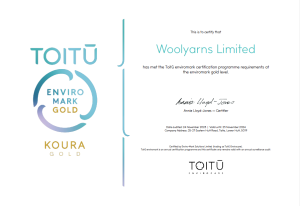Sustainability
At Woolyarns, we take our environmental responsibilities seriously. As part of our commitment to sustainability, we have implemented an Environmental Management System (EMS) that is designed to minimise our environmental impact and promote sustainable practices throughout our operations. Our EMS is aligned with the principles of sustainability, including reducing waste, conserving resources, and promoting environmental stewardship.
Certification – We are proud to hold a Gold certification for our EMS through Toitū Envirocare (Toitū), a globally recognised organisation that provides environmental certifications and assessments.

Toitū – Toitū EMS certification will validate our commitment to environmental sustainability. Through a thorough assessment of our EMS by independent auditors, we will ensure that our EMS meets the rigorous criteria set forth by Toitū. This certification will provide a credible validation of our efforts toward sustainability. To maintain our certification, we will undergo regular audits and use the findings to continuously improve our environmental performance. By integrating Toitū EMS certification into our sustainability initiatives, we aim to inspire confidence among our stakeholders and contribute to a more sustainable future.
Operational efficiency– Woolyarns strive to continually improve our manufacturing processes throughout the production of all of our yarns. Energy and water consumption are high-priority areas for improvement and are analysed every month. The Hutt Aquifer, which is a natural underground reservoir beneath the city supplies our onsite dyeing facility water requirements. Local council evaluations for chemical pollution in wastewater are carried out and Woolyarns complies with all statutory and governmental regulations such as the Resource Management Act.
Woolyarns consistently achieves a low-risk category for trade waste consent.
Products – Woolyarns sources only the highest quality raw materials to produce our yarns. All of our yarns are crafted with human and environmental protection in mind, with no harmful chemical substances present, ensuring that they meet European Union ReaCH standards.
Woolyarns is dedicated to repurposed and recycled yarn programmes that utilise surplus fibre generated during the production process. Reusing materials within the manufacturing process reduces the impact on the planet.
Committed to our people – Every individual at Woolyarns contributes to creating high-end luxury yarns. To sustain this culture, employee feedback is encouraged. Woolyarns is committed to open and constructive communication channels as well as providing surveys that engage with employees at every level. Woolyarns are proud to attract a very diverse workforce that adds a multiplicity of thought. The relentless and innovative team help Woolyarns produce custom-made yarns that no one else can. Retention and continual training of this workforce are critical to offering a consistent supply of the highest quality yarns. Maintaining employees for 10, 20, 30 and even 40-plus years regularly is a testament to the positive culture Woolyarns have developed and the opportunities offered for career progression.
New Zealand already has an internationally recognised and robust legal framework that covers employment relations, labour management, and health and safety guidelines. However, Woolyarns goes beyond these legal requirements ensuring employee wellbeing is a priority. Employees receive regular hearing tests, flu vaccinations, and more.

Community
Throughout Woolyarns history, local families and community have been supported by Woolyarns. Numerous contributions are made to community projects such as the Fraser Park Sportsville centre and a Massey University of New Zealand textile design award recognises a student each year for their contribution to innovation in textiles with the Woolyarns Limited Jim Wood Memorial Scholarship.